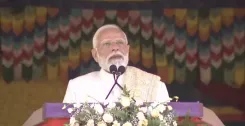Could the Sabarimala Gold Theft Influence Kerala’s Local Body Elections?

Synopsis
Key Takeaways
- The Sabarimala gold theft scandal could influence Kerala's local body elections.
- The ruling LDF is accused of protecting those involved in the theft.
- The controversy revives past political tensions from the 2019 Lok Sabha elections.
- Voter sentiment around faith and governance is crucial in these elections.
- Over 1.33 crore voters are registered for the upcoming elections.
Thiruvananthapuram, Nov 11 (NationPress) As Kerala prepares for the upcoming two-phase local body elections scheduled for December 9 and 11, the ruling Left Democratic Front (LDF) is facing a significant controversy that may influence the political landscape well beyond these elections — the reported theft of sacred gold ornaments from the esteemed Sabarimala temple.
This scandal, centering around the missing gold decorations intended for the deity, has ignited a wave of outrage among devotees and provided the opposition with a compelling tool for their campaign.
The Congress-led United Democratic Front (UDF) and the Bharatiya Janata Party (BJP) have accused the LDF government of protecting those accountable, labeling it a “breach of faith.”
This controversy has rekindled memories of the 2019 Lok Sabha elections, where the entry of two women into the temple, against traditional rituals, sparked widespread backlash.
During those elections, the UDF emerged victorious, securing 19 of the 20 parliamentary seats, while the Left suffered significant political repercussions.
Now, the gold theft issue threatens to reopen the same religious divides that previously distanced the LDF from parts of the Hindu voter base.
The first phase of polling on December 9 will encompass Thiruvananthapuram, Kollam, Pathanamthitta, Alappuzha, Kottayam, Idukki, and Ernakulam, while the second phase on December 11 will involve Thrissur, Palakkad, Malappuram, Kozhikode, Wayanad, Kannur, and Kasaragod.
Vote counting is scheduled for December 13. Elections will be held in 1,199 local bodies across 23,576 wards, with 33,746 polling stations, 1,37,922 ballot units, and 50,691 control units prepared for the event.
The final voters' list includes 1.33 crore men, 1.49 crore women, and 271 transgender individuals. Malappuram boasts the largest electorate at 35.7 lakh, while Wayanad has the smallest at 6.4 lakh.
The LDF, currently governing five of the six municipal corporations and holding sway over local self-government institutions, aims to strengthen its position through welfare initiatives and development programs.
Conversely, the UDF sees these elections as a crucial opportunity for revival, while the BJP aspires to broaden its urban support.
With the emotionally charged Sabarimala issue once again in the limelight, the upcoming polls could transform into a referendum on faith, governance, and political accountability in Kerala.









